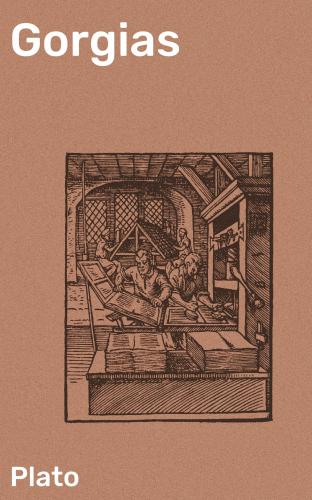Under the rule of Cronos, men were judged on the day of their death, and when judgment had been given upon them they departed—the good to the islands of the blest, the bad to the house of vengeance. But as they were still living, and had their clothes on at the time when they were being judged, there was favouritism, and Zeus, when he came to the throne, was obliged to alter the mode of procedure, and try them after death, having first sent down Prometheus to take away from them the foreknowledge of death. Minos, Rhadamanthus, and Aeacus were appointed to be the judges; Rhadamanthus for Asia, Aeacus for Europe, and Minos was to hold the court of appeal. Now death is the separation of soul and body, but after death soul and body alike retain their characteristics; the fat man, the dandy, the branded slave, are all distinguishable. Some prince or potentate, perhaps even the great king himself, appears before Rhadamanthus, and he instantly detects him, though he knows not who he is; he sees the scars of perjury and iniquity, and sends him away to the house of torment.
For there are two classes of souls who undergo punishment—the curable and the incurable. The curable are those who are benefited by their punishment; the incurable are such as Archelaus, who benefit others by becoming a warning to them. The latter class are generally kings and potentates; meaner persons, happily for themselves, have not the same power of doing injustice. Sisyphus and Tityus, not Thersites, are supposed by Homer to be undergoing everlasting punishment. Not that there is anything to prevent a great man from being a good one, as is shown by the famous example of Aristeides, the son of Lysimachus. But to Rhadamanthus the souls are only known as good or bad; they are stripped of their dignities and preferments; he despatches the bad to Tartarus, labelled either as curable or incurable, and looks with love and admiration on the soul of some just one, whom he sends to the islands of the blest. Similar is the practice of Aeacus; and Minos overlooks them, holding a golden sceptre, as Odysseus in Homer saw him
Конец ознакомительного фрагмента.
Текст предоставлен ООО «ЛитРес».
Прочитайте эту книгу целиком, купив полную легальную версию на ЛитРес.
Безопасно оплатить книгу можно банковской картой Visa, MasterCard, Maestro, со счета мобильного телефона, с платежного терминала, в салоне МТС или Связной, через PayPal, WebMoney, Яндекс.Деньги, QIWI Кошелек, бонусными картами или другим удобным Вам способом.
